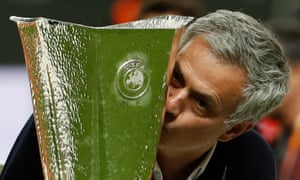
As Manchester United’s players celebrated with the Europa League trophy, José Mourinho brandished a red flag. He walked in front of his squad and tried to plant it into the pitch. The pole, though, was too flimsy and bent, leaving Mourinho to prop the flag awkwardly against a hoarding reading “Stockholm Final 2017”. As a metaphor for his first season at United it could hardy have been bettered: grand gestures thwarted but the job eventually, just about, done.
It was a night replete with symbolism. Deep into injury-time at the Friends Arena on Wednesday night, the Ajax winger Amin Younes picked up the ball on the left. He glanced up and had just made as though to jink inside when he was clattered by the horizontal form of Wayne Rooney making an effective if clunking challenge that put the ball out for a throw-in. That it could be his last ever touch in a United shirt felt hugely appropriate; he has throughout most of his career had a pleasing commitment to the necessary but unglamorous work.
But it also said something about Mourinho’s United and how they overwhelmed Ajax in a generally underwhelming final. This is the most expensive football squad ever assembled, and yet it ended with Marouane Fellaini playing as a lone striker.
Whether that matters or not depends on perspective. In the immediate context, it probably doesn’t.
Mourinho’s celebrations, kissing the trophy before it was presented to Rooney and then pretending to run off with it as the players celebrated in front of the United fans suggested just how much this meant to him, just how essential victory and qualifying for next season’s Champions League is to United’s rebuilding work. Winning was the critical thing; the how can come later.
It’s not, though, as simple as that. Mourinho is not a manager who occasionally adopts a policy of pragmatism to achieve a specific goal, before switching to something more expansive. Rather, he revels in discarding aesthetic expectations, in scorning “the poets” whose idealistic abstractions “win every match”.
This season Mourinho attacked the “Einsteins” who were opposed to him; railing against the arts and the sciences, he truly is a man under siege. Wednesday’s win, Mourinho said, was “a victory of the pragmatism, a victory of the humble people, a victory of the people who respect the opponents, a victory of the people who try to stop the opponents and exploit their weaknesses”.
In that sense, this was a Mourinho masterclass. Ajax have thrilled this season with their high pressing and the fluency of their play, but United thwarted that. As their coach, Peter Bosz, said: “I didn’t see that Ajax here.”
Mourinho has, with some fury, dismissed the veracity of certain claims in Diego Torres’s biography of him, but the seven-point plan laid out for winning big games held true here.
United minimised their risk, let Ajax have the ball and seized on their mistakes. “High pressing was difficult because Manchester United only played long balls, didn’t take any risks and played only on second balls,” Bosz said. “I think it was a boring game.”
Perhaps for neutrals it was but that will not bother Mourinho. “There are lots of poets in football,” he said, “but poets don’t win titles.” Avoiding risk was one part of the strategy; the other was to cut off the supply to Kasper Dolberg.
